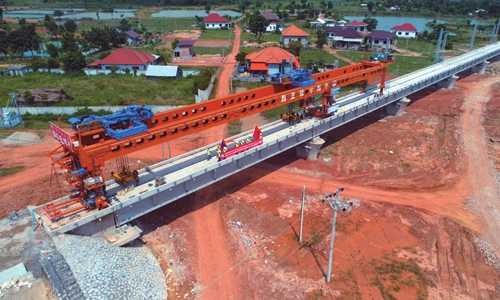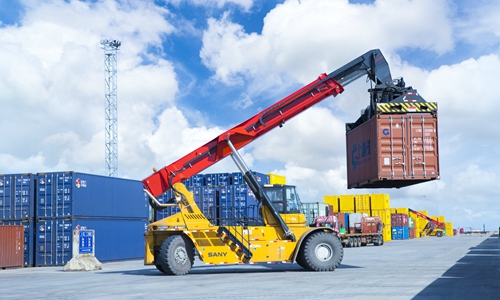
The construction of the main structure for the longest bridge along the China-Laos Railway Photo: cnsphoto
From the coup in Guinea to the revolt in Myanmar and the reconstruction of Afghanistan, their possible impacts upon major Belt and Road projects with the participation of Chinese companies have always been under the spotlight.
Despite the challenges posed by the changing situation in these countries, most projects remain on track. Experts said it proves that the Belt and Road Initiative (BRI) benefits ordinary peoples' livelihoods and the economic independence with the full respect of local countries' sovereignty and internal affairs.
In the recent launch of the new edition of the handbook of the Belt and Road by the Chinese Academy of Social Sciences (CASS) which marks the eight-year anniversary of the initiative, Chinese scholars, experts, government officials and former diplomats joined together for a open discussion about what the BRI has encountered and what could be expected in the future.
One important topic that was raised by some experts is the new challenges to the implementation of the BRI projects due to multiple factors including political change, regional instability, debt issues, which are partially reflected on what is happening in the countries such as Guinea, Myanmar and Afghanistan.
In spite of the turmoil seen in some countries, the overall situation will not have negative impacts on improving and expanding the BRI, Zhang Zhongyuan, associate research fellow with the National Institute of International Strategy of the CASS, told the Global Times, adding that "because BRI can help those countries achieve economic autonomy and enable them to have hematopoietic functions."
Recent investigation undertaken by the Global Times also indicates what has happened in the three countries has only a limited impact on Chinese projects there. Several government officials in these countries even approached the Chinese embassies or business representatives to assure that the Chinese projects and business there would not face a risk.
In a meeting hosted by the National Rally and Development Committee (CNRD) in Guinea and the Chinese Embassy on Wednesday, Mahamady Doumbouya, head of the CNRD, emphasized that the CNRD is working hard to promote social stability and economic development, ensuring compliance with all bilateral and multilateral commitments and agreements, and hopes that the Chinese partners in Guinea maintain normal production and operation, according to media reports.
Renewed momentum
What Chinese companies are doing via the BRI is mutually beneficial and win-win, and are really helping countries by solving employment problems, paving roads and building houses, providing electricity and even founding schools, experts said.
"What we are doing is to benefit ourselves and the host country, and at the same time, China has set up a bottom line when it comes to managing construction risk across BRI projects," Xue Li, research fellow with the Institute of World Economics and Politics of the CASS, told the Global Times.
One example is the Peshawar to Karachi Motorway (PKM) project, the largest infrastructure project under the China-Pakistan Economic Corridor, a significant example of how China's project helps countries with their own domestic development. The length of the PKM project is 392 kilometers, with the design speed of 120 kilometers per hour.
Another example is the completion of the construction of the main structure for the longest bridge along the China-Laos Railway by China Railway No.5 Engineering Group in mid-July. The China-Laos Railway is a docking project between the BRI and Laos' strategy to convert itself from a landlocked country to a land-linked economic hub.
As of June, China has signed 206 cooperation documents with 140 countries and 32 international organizations to jointly build the BRI, covering diversified areas including interconnection, investment, trade, finance and technology, according to media reports.
Although the global epidemic continues to spread, most China's projects remain unaffected. Gao Feng, the spokesperson of the Ministry of Commerce, stated at a press conference on August 26, that from January to July, China's offshore outsourcing contracts undertaken by countries along the Belt and Road reached 109.6 billion yuan ($16.98 billion), a year-on-year increase of 46.1 percent.
Despite US President Joe Biden's recent attempt to come up with a so-called similar initiative to confront the BRI, some observers view the stunt as an ill-intended move which will product little in the way of actual assistance to developing countries.
China does not impose too many additional conditions, which is very different from the US - the latter often tying conditions to international support, Xue said.

